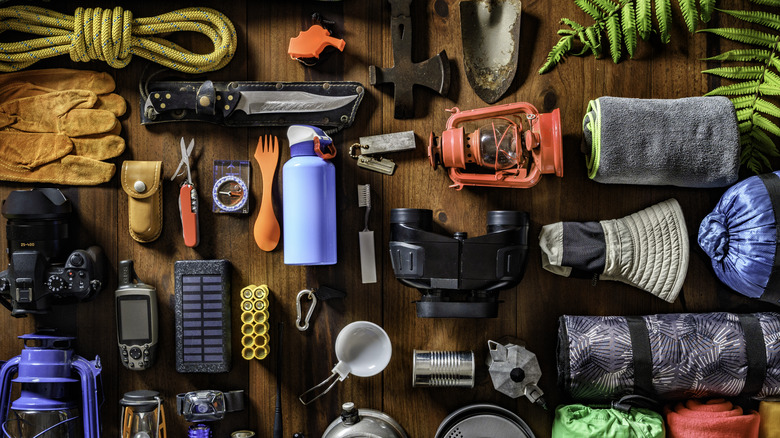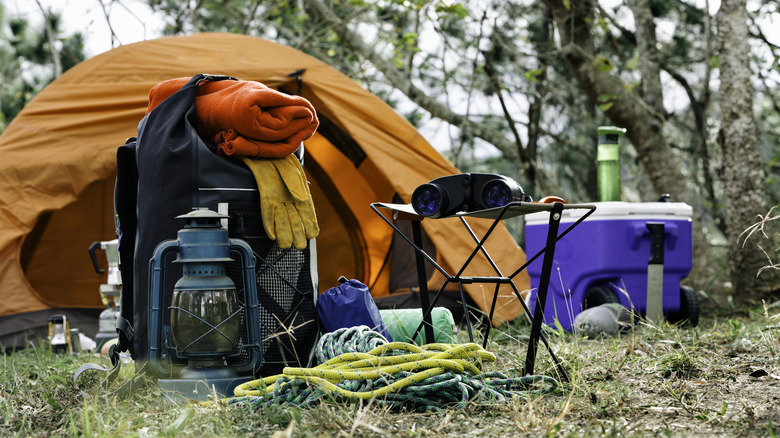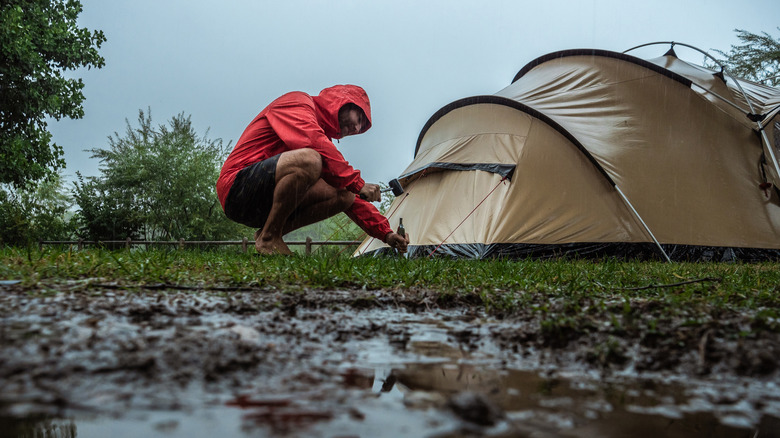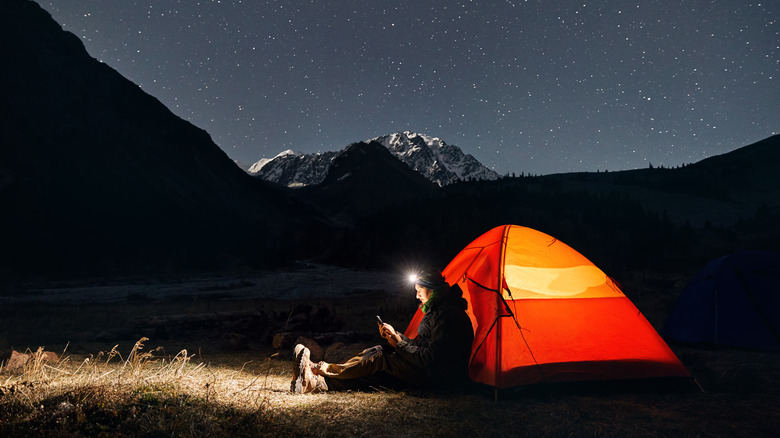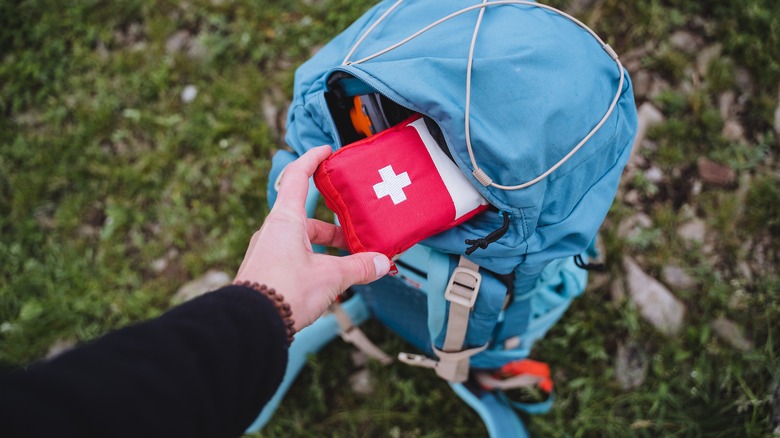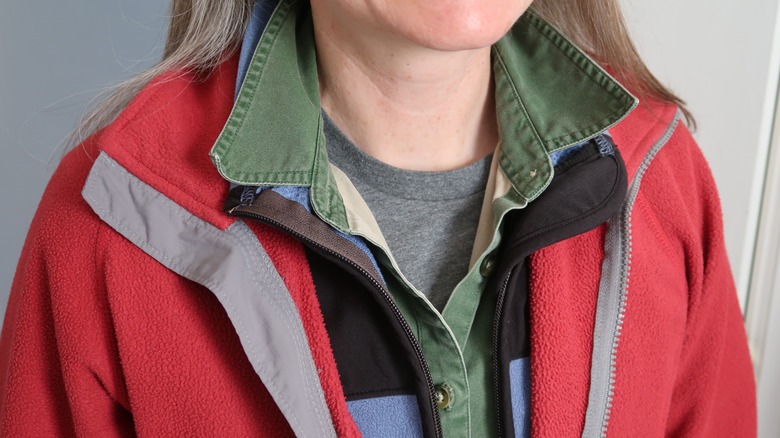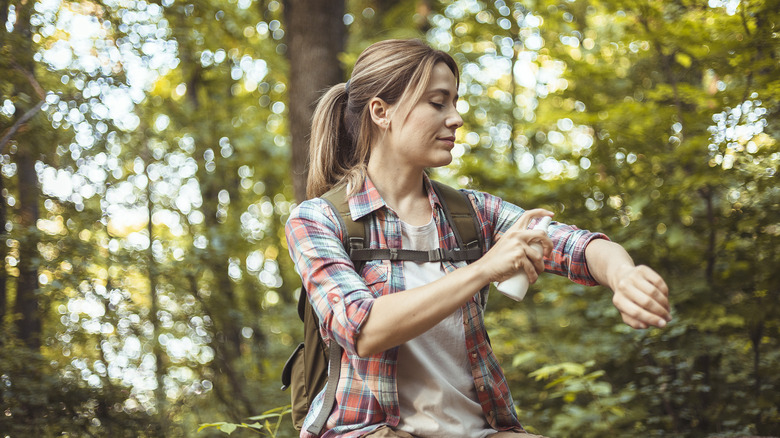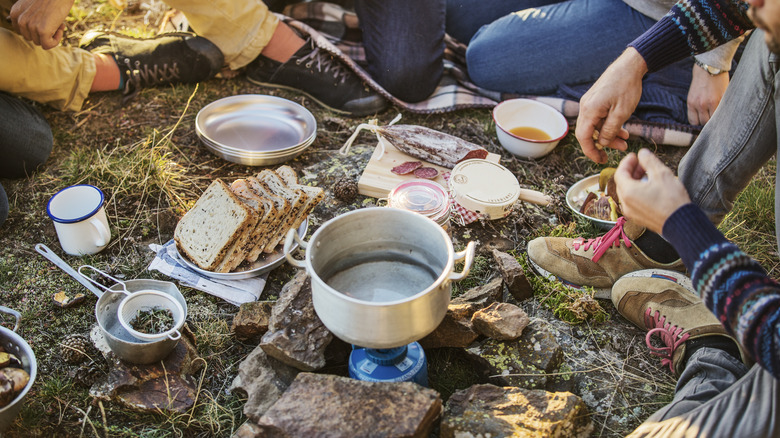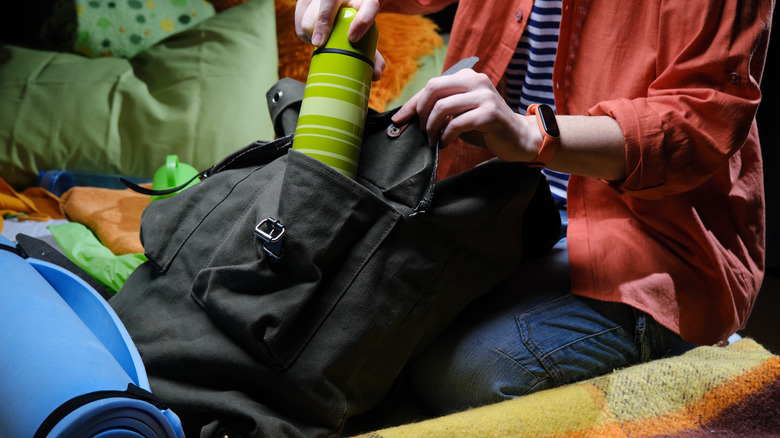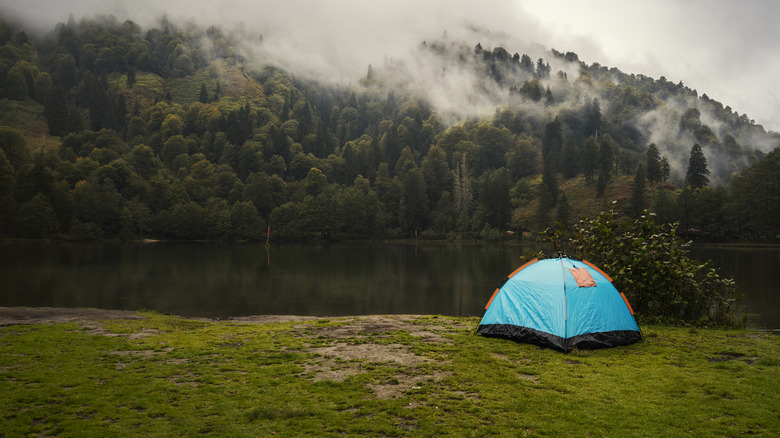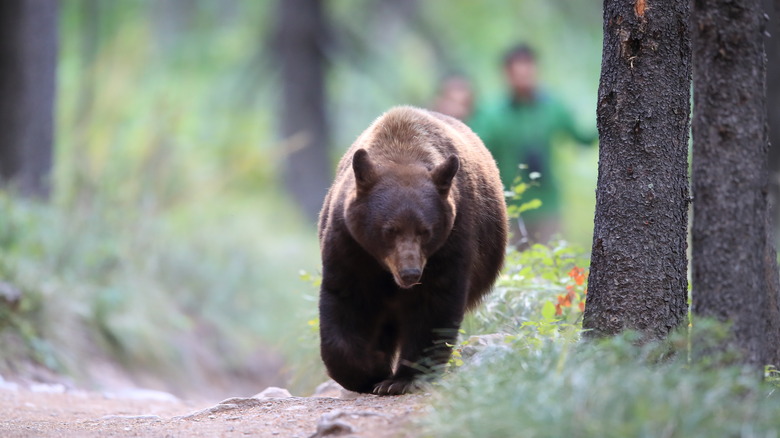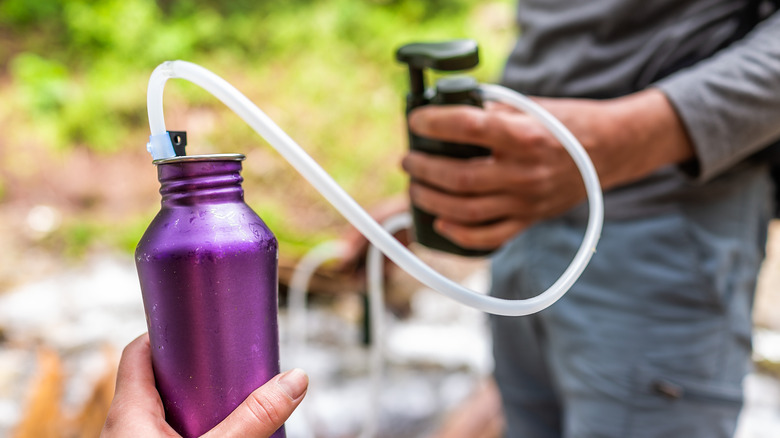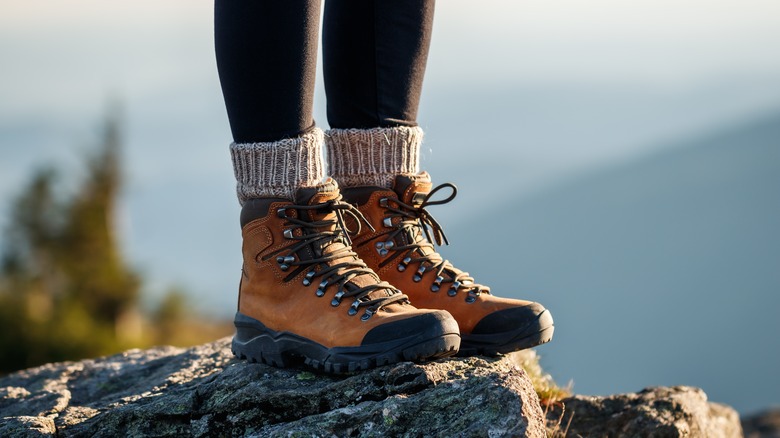The 12 Biggest Mistakes To Avoid When Packing For A Camping Trip
It is no secret that Americans love camping. In fact, according to The Dyrt's 2023 Camping Report, there are over 80 million campers in the United States, with 7.2 million of those being first-timers. It is easy to see the appeal. Camping has enormous physical and mental health benefits, like relationship building and the learning of new skills. Still, with the number of newcomers increasing every year, there is definitely a learning curve when it comes to knowing exactly what to pack.
It doesn't matter if you're solo backpacking the Appalachian Trail or nestling for a week in one of America's numerous breathtaking campgrounds; you need to pack for the occasion. You need to think about things like lighting, first aid, food, water, clothing, weather protection, and footwear. Experienced campers will have detailed organizational packing systems in place. Beginners, however, will likely fall victim to some pretty big mistakes.
Packing mistakes can either be a mild nuisance or potentially life-threatening. Regardless, the degree to which a camper chooses to pack will impact their trip. We'll discuss exactly what these mistakes are, why they should be avoided, and how they can be fixed.
Overpacking
You don't need as much stuff as you think you do. One of the reasons you're headed off into the woods is to take a break from the luxuries of day-to-day living. Why burden yourself with nonessentials? If you overpack for your trip, you're going to end up with a cluttered campsite. That is more stuff you need to keep track of. And if the clutter in your home gives you stress, just imagine how stressful your campsite is going to be. A good rule to follow: if you've loaded your car to capacity, you've brought too much.
Nowhere is overpacking more burdensome than when backpacking. A classic hiking mistake, an overpacked, heavy backpack can bring about faster exhaustion and cause excess muscle strain. The more tired you are, the easier it is to slip up. Therefore, for safety, your pack should be no heavier than 20% of your own body weight. So, for a 200-lb hiker, that would be a 40-lb backpack.
It really is best to stick to essentials. Start by creating a list of what you absolutely will need for camping and go from there. Think food, extra clothing, weather gear, shelter, first aid, and the like. Don't pack anything you aren't prepared to get dirty. Once you've determined these essentials, you'll be able to pack more efficiently and lightly.
Not testing your gear
This rule applies to all gear, new or used. Testing your gear before a trip will ensure that any kinks will be sorted out long before you reach the campsite. The timeframe in which to do this varies, but two days to a week of testing is sufficient. Doing it the night before or the day of is going to cause unnecessary stress.
Always test gear that you are going to rely upon for essential functions. Set up your tent in the backyard when you know it's going to rain to make sure that there are no leaks. Light your camp stove and boil some water to make sure the stove is working. If you're a backpacker, check your pack for any structural problems like loose straps or fraying seams. It's also a good idea to take a walk with your loaded backpack to prepare your body for the hike ahead. If you've got new hiking shoes, test those out too.
Think of these tests as insurance. They may be aggravating to do, but you'll certainly be glad you've done them once you're camping. The very last thing you want is not to be able to cook because you didn't check the camp stove or wake up to water dripping on your head because you didn't bother to check the tent. Take the time to test your gear. You won't regret it.
Packing poor or no lighting
Unless you've got an RV to hook up at the campsite, you'll be relying on battery — or fuel-powered lights to find your way around. It is a huge mistake to forget to pack lights or pack lights that are on their last legs. Most campsites do not have lamps to light the way, and if you're out backpacking, the likelihood of a pitch-black night is even higher.
It is a good idea to have lights with different power sources. Any good outfitter will carry battery, propane, butane, and kerosene-powered lights. Each has its benefits and drawbacks. Batteries need to be charged and re-charged, while the combustibles rely on canisters to provide light. So, if you go camping with low stocks of any of these, chances are you're gonna be in the dark real quick.
Not being able to see your way around a campsite is going to be aggravating and unsafe. Wandering into another camper's tent just because you don't have the right light is no way to make friends. Go equipped with the minimum of a lantern for your table and tent, and a headlamp or flashlight for exploratory purposes. Make sure the batteries are charged and you have plenty of fuel before you leave. You can make that part of your preparation checklist.
Not packing a first aid kit
Murphy's Law goes as such: if you don't have first aid when you go camping, you're going to get hurt. That is the plain truth. Of all the mistakes on this list, not packing first aid has to be among the biggest. Though most first aid kits are only equipped to treat minor injuries, that treatment could prevent further infection or increased injury down the line. We're going to hammer this home. You need to bring first aid with you when you go camping.
Far from being cumbersome, modern first aid kits are easily packable and come loaded with essentials like bandages, disinfecting wipes and creams, gauze rolls, blister pads, and tweezers. More intense options are available that include survivalist gear like emergency blankets, medicines, towels, whistles, and even flares. Most campers will only need the former, but those heading to remote areas would do well to purchase the latter.
Obviously, broken bones, deep wounds, or bites from animals like snakes require immediate professional medical attention. However, for cuts, bruises, bee stings, mosquito bites, bruises, and minor burns, a classic camping first aid kit is the way to go. Please do not forget it.
Not packing layers
If you've ever been caught making this mistake, you know how drastically it can affect your camping experience. The summer months are when the majority of people go camping. While it may be hot and humid during the day, when the sun sets, temperatures can cool down really quickly. And if you haven't packed appropriate layers, you're gonna get cold. Fast.
The fact is that layers, more so than a larger, thicker item of clothing, are going to keep you warm. Layers make for a less cumbersome pack because it is very easy to store a good amount of them in a smaller space. Another bonus is that layers can be easily added and removed. If you're chilly, throw on pants or an extra shirt. If you're hot, remove an item. Having the ability to do this aids in adjusting to the various temperatures of a given day.
Basic layering items include things like polyester long underwear, a lightweight fleece jacket, rain shells, hiking pants, shorts, and some extra shirts. Make sure these are made from moisture-wicking fabrics like wool or synthetics. Don't wear anything cotton-based, as it will hold onto moisture and make things really uncomfortable.
Forgetting sunscreen and bug spray
Anyone who has suffered from a sunburn or bug bite knows that, while not immediately life-threatening, they are nevertheless extremely annoying. Forgetting to bring sunscreen, however, is actually going to put you in more danger than not. As a general rule, the American Academy of Dermatology recommends that everyone wear a water-resistant sunscreen SPF 30 or higher. This base keeps your skin protected from the harmful UVA and UVB rays the sun puts out.
Bug spray, on the other hand, is excellent at keeping your camping trip itch-free. Most store-bought repellents rely on Deet and other chemicals to keep the bugs away. If you are chemically averse, you can use essential oils like citronella, peppermint, lemongrass, lavender, or sage. Whichever route you go, you'll be happy you remembered it. Few things are more annoying when camping than mosquitoes that won't leave you alone.
So, make sure you add bug spray and sunscreen to your list of essentials. Most come in manageably sized bottles, so you shouldn't have any trouble fitting them in amongst your other gear.
Packing insufficient foods
No matter how long your camping trip is, having the right amount and the right kind of food is of vital importance. Keeping your body fueled is a fundamental part of camping safety. The types of food you bring are in correlation to the type of camping you're doing. For tenting at a site, a combination of fresh, cold, hot, and shelf-stable foods are best. Meanwhile, prudent backpackers will rely on smaller foods like nuts, energy bars, meal packets, and fruits.
Meal planning is of importance here. If you know ahead of time what you are going to be eating, getting everything ready in advance is going to be much easier. Having easy, make-ahead meals like overnight oats, breakfast sandwiches, burritos, or pasta salad prepared in advance of your trip will only aid you.
No one wants to run out of food when they are camping, and no one wants to be stuck eating a bag of trail mix while everyone else is grilling up burgers. By packing a good amount of the right foods, you guarantee proper nourishment, and proper enjoyment.
Not organizing your pack
The hiking backpack holds all of the essentials that make a trip as enjoyable as possible. Your tent, spare clothes, first aid, food, and water bottles can all fit into a good backpack. The thing is, though, no matter how much you can squeeze into your backpack, if the gear isn't properly organized, your pack will be more hindrance than help.
Organizing your pack makes it easier to wear and makes camp set up and breakdown a breeze. Plus, when you know exactly where things are, you can find them a lot easier. Backpack packing is broken into four sections: bottom, middle back, middle front, and top. At the bottom of the pack goes your sleeping back and any middle-weight gear like bulk food. The middle back is for heavier items like tents and cookware. The middle front is for clothes and toiletries. The top is for lightweight, easy-to-grab essentials like first aid, water filters, and snacks.
Organizing your backpack in this way keeps the essentials close at hand while minimizing the time you would otherwise spend digging through your pack.
Not packing for the weather
Everyone wants their camping trip to be sunny and uneventful, but this is not always the case. Depending on where you are, snow can be a problem even in the height of summer. Rain is a constant throughout much of the United States, and the extreme high and low temperatures of desert camping can cause a lot of issues for the unprepared. This is why, no matter where you are camping, it is wise to pack for the weather.
This doesn't just mean having an extra pair of clothes on hand in case things get wet. Does your tent have a rain cover to redirect water? Does it have a proper footprint to keep ground water from pooling inside? Do you have a pop-up canvas to put over any gear you leave outside? Do you have a hat or umbrella to keep out of the sun? Do you have emergency items to protect you during a snowstorm? These are questions you need to ask before you go camping.
Being prepared for the weather is a key factor in your enjoyment of your trip. You can still have fun in the rain, so long as you have a dry place to get back to. Not only that but having a sanctuary to keep out of bad weather will keep you safer in the long run.
Packing fragrance
Bringing your favorite fragrance along when camping is not a common mistake, but it could have drastic consequences. You see, cologne and other enticing scents are not ones that occur naturally in the great outdoors. As a result, they are likely to bring a whole manner of different creatures curiously crawling into your tent. Bugs are certainly going to be aroused by whatever you're wearing, but that isn't going to be your biggest problem. Bears are.
Regardless of where you go camping in the United States, the likelihood of you running into a bear is a lot higher than you want to believe. The chances of an encounter increase if you bring along any of your favorite scented soaps or deodorants. Bears have an amazing sense of smell, and they will use that sense to seek out any smells they find interesting. This is usually reserved for food, but those bath soaps you brought from home are just as interesting.
For the safety of yourself and everyone else in camp, please avoid bringing anything scented with you. Smells travel a lot farther than you think they do and will very likely attract many unwanted visitors to your area.
Forgetting a water filter or purifier
Even the most experienced hikers and campers will find themselves short of water at some point. What happens next is the need to source some more, either from the camp well or from nature itself. While the ability to locate water is essential, if you're not able to make that water drinkable, it is of no use to you. This is why you should always be in the habit of packing water filtration and purification systems.
Unfiltered water can contain harmful substances, such as parasites, bacteria, and viruses. Filtration systems work to get rid of these things and provide you with clean drinking water. Some systems use advanced filtration technologies, while others rely on things like activated charcoal, iodine tablets, and UV light. However, these systems can get expensive, which is why the CDC recommends boiling water as the surest way to get rid of harmful substances.
The heat created by boiling will kill viruses, bacteria, and other organisms. You need to boil the water for at least a minute, or up to three if you're at an elevation above 6,500 feet. This can be done with a basic pot and camp stove setup, which most campers and hikers have.
Packing the wrong shoes
You're not going to be wearing heels or ultra-expensive collector sneakers to the campsite. That would be impractical. The types of shoes you should be packing are ones that can stand up to the great outdoors without falling apart. Think hiking shoes or boots for wandering around the campsite and a pair of sturdy sandals or flip-flops to bring to the camp showers if they're available.
Good camping footwear needs to be substantial for work, yet light enough not to be overbearing. Packing the right shoes is going to do wonders for your feet. You'll feel comfortable, and if you encounter puddles or more difficult terrain, your footwear will keep your feet dry as well as provide added stability. Plus, good shoes will also protect your feet from roots, insects, and other ground hazards.
None of these mistakes need to be made. All can be remedied with proper planning and good equipment. Still, if they are made, hopefully, the experience will teach you never to make them again. Happy camping.
